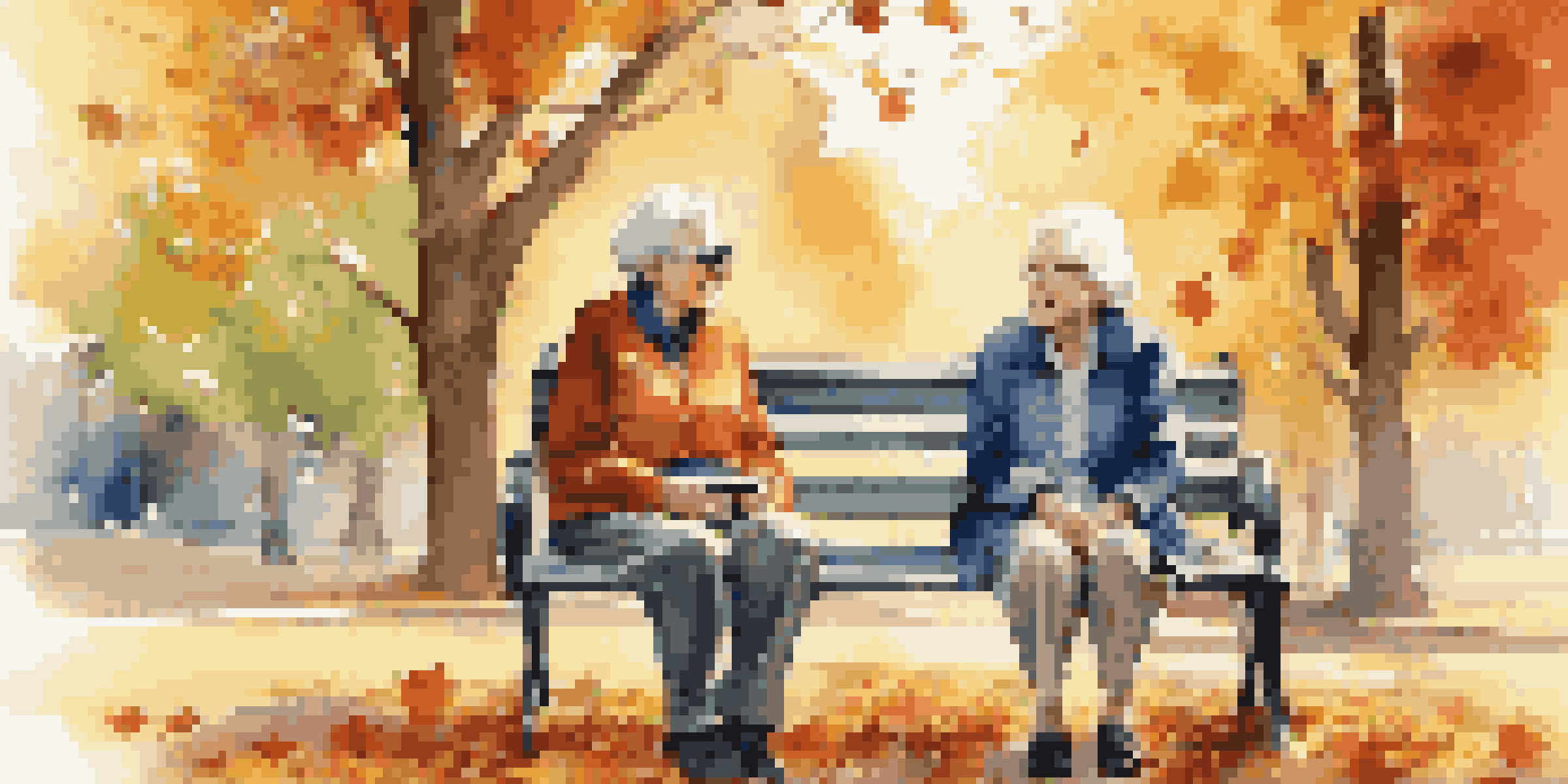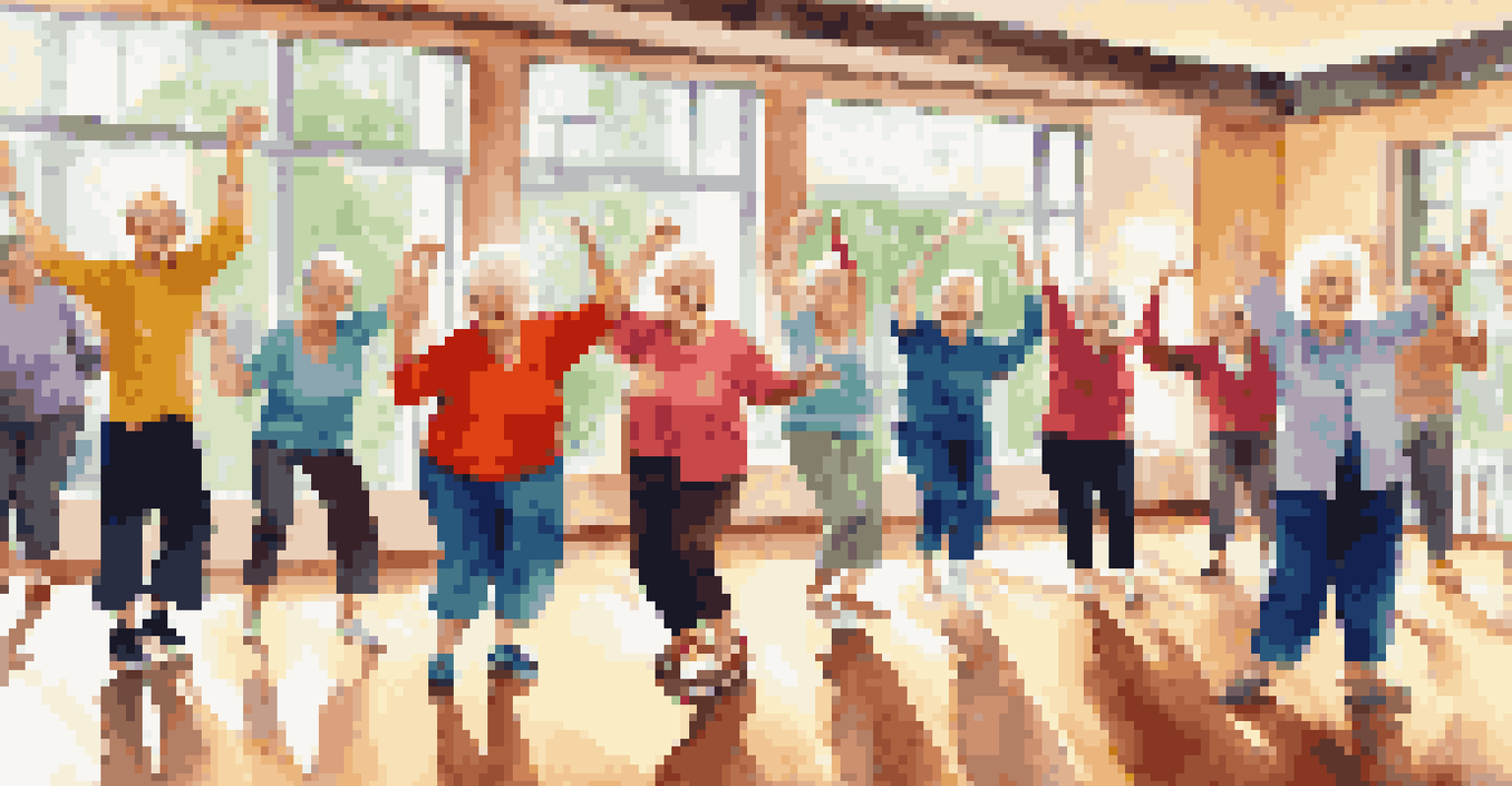Assessing the Impact of Music on Seniors' Daily Routines

Understanding Music's Psychological Benefits for Seniors
Music has a remarkable ability to evoke emotions and memories, which can be particularly beneficial for seniors. It can help alleviate feelings of loneliness and depression, creating a sense of connection to their past. When seniors listen to their favorite songs, they often recall joyful moments, which can enhance their overall mood.
Music can change the world because it can change people.
Moreover, music can stimulate the brain, promoting cognitive functions such as memory and attention. Research shows that engaging with music can lead to the release of dopamine, a neurotransmitter associated with pleasure and reward. This interplay between music and mood can help seniors feel more engaged and motivated in their daily lives.
Incorporating music into daily routines, like during meal times or exercise, can create positive associations and encourage consistency. For instance, playing familiar tunes while cooking can make the experience more enjoyable, turning a mundane task into a joyful activity.
Music as a Tool for Physical Activity in Seniors
Physical activity is essential for seniors' health, and music can serve as a powerful motivator. Upbeat songs can energize workouts, making activities like walking or dancing feel more enjoyable. For many seniors, the rhythm of music encourages them to move, increasing their overall physical activity levels.

Group activities, such as dance classes or music therapy sessions, can further enhance the social aspect of exercising. These gatherings not only promote physical health but also foster a sense of community among participants. Sharing the joy of music can create lasting friendships and reduce feelings of isolation.
Music Boosts Seniors' Mental Health
Listening to music can evoke positive memories and emotions, helping seniors alleviate loneliness and enhance their mood.
Additionally, music can help improve coordination and balance, which are crucial as we age. The connection between rhythm and movement allows seniors to practice these skills in a fun and engaging way, making exercise feel less like a chore and more like a celebration.
Enhancing Memory and Cognitive Skills Through Music
Many studies highlight music's ability to enhance memory and cognitive skills in seniors. Listening to music, especially familiar tunes, can trigger memories and facilitate recall. This is particularly valuable for those experiencing memory loss, as music often remains accessible even when other memories fade.
The beautiful thing about music is that it transcends language.
Music therapy has emerged as a popular method for improving cognitive function in seniors. Through structured activities like singing or playing instruments, seniors can engage their minds and foster creativity. This engagement not only sharpens cognitive skills but also promotes self-expression and emotional release.
Moreover, incorporating music into memory-related activities, such as reminiscing sessions, can create a more stimulating environment. For instance, playing songs from a specific era can prompt discussions and storytelling, allowing seniors to share their life experiences and strengthen their social bonds.
Creating Routines Around Music for Better Engagement
Establishing a daily routine that includes music can provide structure and stability for seniors. This can be as simple as starting each day with a favorite playlist or incorporating music into mealtime. Consistent musical cues can signal the start of various activities, helping seniors transition smoothly throughout their day.
Furthermore, engaging with music at specific times can create a sense of anticipation and excitement. For example, setting aside time for a weekly sing-along can give seniors something to look forward to, boosting their overall mood. These routines can foster a sense of purpose, encouraging seniors to participate actively in their daily lives.
Music Encourages Physical Activity
Upbeat music can motivate seniors to engage in physical activities, making exercise feel more enjoyable and less like a chore.
In addition, technology has made it easier than ever to access music. From streaming services to personalized playlists, seniors can curate their own musical experiences, ensuring they have their favorite tunes readily available to enhance their daily routines.
Music's Role in Social Interactions Among Seniors
Music can serve as a powerful connector among seniors, promoting social interactions and reducing feelings of isolation. Group activities centered around music, such as karaoke nights or musical performances, can bring people together, fostering friendships and camaraderie. These shared experiences can enhance emotional well-being and create lasting memories.
Moreover, discussing music preferences or sharing stories related to favorite songs can spark engaging conversations. This not only strengthens social bonds but also encourages seniors to reminisce about their past, sharing valuable life experiences with one another. Such exchanges can be deeply fulfilling and enriching.
Additionally, music can be a bridge between generations, allowing seniors to connect with younger family members. Sharing musical tastes or attending concerts together can create meaningful interactions, helping to build a sense of unity and understanding across age gaps.
Music Therapy: A Professional Approach to Well-Being
Music therapy is a specialized field that harnesses the power of music to promote healing and well-being in seniors. Certified music therapists use tailored approaches to address various needs, from cognitive decline to emotional distress. This professional guidance can significantly enhance the benefits of music for seniors.
Through structured sessions, music therapists design activities that target specific goals, such as improving communication or relieving anxiety. These sessions can involve singing, playing instruments, or even songwriting, allowing seniors to express themselves creatively. The therapeutic environment fosters a sense of safety and support, encouraging personal growth.
Music Fosters Social Connections
Group music activities can strengthen social bonds among seniors, reducing feelings of isolation and promoting camaraderie.
Furthermore, music therapy can be particularly beneficial for seniors with dementia or Alzheimer’s disease. Research shows that engaging with music can evoke strong memories and emotions, providing comfort and connection even when verbal communication becomes challenging.
The Future of Music and Technology in Senior Care
As technology continues to evolve, the integration of music into seniors' lives is becoming more accessible and diverse. Smart speakers, music streaming apps, and even virtual reality experiences are revolutionizing how seniors engage with music. These innovations can help create personalized musical environments tailored to individual preferences.
For instance, platforms that curate playlists based on mood or activity can enhance the overall experience for seniors. Imagine a morning playlist designed to energize or soothing tracks for relaxation; technology can play a vital role in enhancing daily routines. This accessibility allows seniors to enjoy music without relying solely on others to provide it.

Additionally, virtual concerts and music events can bring the joy of live performances directly to seniors’ homes, allowing them to experience the thrill of music from the comfort of their living rooms. This fusion of music and technology promises to enrich the lives of seniors, providing them with endless opportunities to connect and thrive.